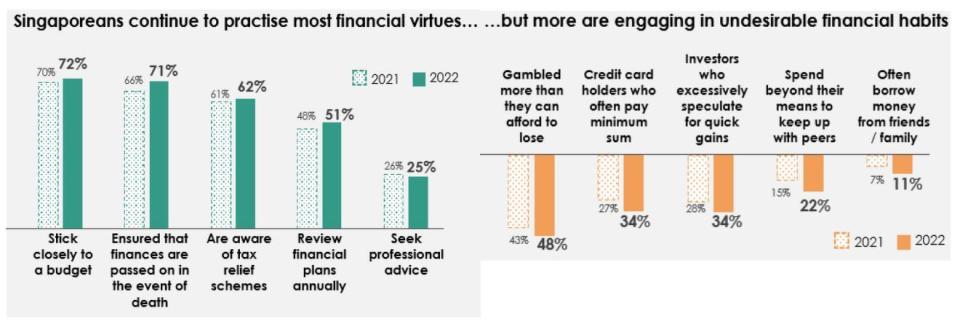Young crypto investors still plan to invest in cryptocurrencies despite crash: OCBC Financial Wellness Index

According to the index, young Singaporeans are found to have been keener on crypto in order to build their wealth quickly.
Amid the challenging macroeconomic environment in 2022, including record-high inflation, rising interest rates and geopolitical uncertainty, the Oversea-Chinese Banking Corporation (OCBC) Financial Wellness Index 2022 dipped to 61, reversing from 2021’s gains at 62.
The score also represented a return to 2020 levels, during the height of the Covid-19 outbreak.
The index, which was launched in 2019, is a measurement of the state of Singaporeans’ financial wellness. The index is based on 10 pillars of financial wellness, which include saving habits, protection from financial emergencies and regular investing. The 10 pillars were defined by OCBC’s wealth management experts.
According to OCBC, the decline in the index came on the back of lower investment returns, an increase in debt stress, as well as derailed retirement plans. The index also noted that there were higher rates of gambling, reckless spending and speculative investing from its respondents.
In this year’s edition, the index surveyed 2,182 working adults in Singapore aged between 21 and 65 years old. The survey was carried out in August.
Young investors still positive on crypto despite crash
According to the index, young Singaporeans are found to have been keener on cryptocurrencies in order to build their wealth quickly.
Of those surveyed, about 14% -- or close to one in six – Singaporeans in their 20s are invested in high-risk, high-return products.
At the same time, 18% of Singaporeans in their 20s are invested in cryptocurrencies.
Despite the crash in cryptocurrencies this year, the index found that young crypto investors still plan to put their money into cryptocurrencies in the next 12 months.
According to the index, two in five Gen Z and young millennial Singapore investors in their 20s plan to invest in cryptocurrencies even after losing about 40% from their crypto investments on average.
Singaporeans in their 30s were found to have a similar appetite for risk with 12% invested in high-risk, high-return products. Of those in the same age group, 14% of them were invested in cryptocurrencies.
The appetite for investing in riskier assets has seen more young Singaporeans making overall losses on their investments.
About 42% of investors in their 20s made an overall loss on their investments, up from 2021’s 19%, while 35% of investors in their 30s made an overall loss, up from 2021’s 10%.
In comparison, 8% of respondents aged between 40 to 54 years had money in cryptocurrencies, while 4% of respondents aged 55 and above indicated that they were invested in cryptocurrencies.
To OCBC’s head of wealth advisory Aaron Chwee, there is still “a long way” for crypto to do what it is meant to do.
He explains that at this point, trust [for cryptos] is still “not in place” and that there are no infrastructures yet to ensure that the instrument is being properly regulated (even if the point of crypto lies in its decentralised nature).
“[Cryptocurrencies] are still not at the state where it’s going to be commonly adopted. If you take a step back, you should ask – is there going to be a huge financial impact to the world now?” he says.
Though the number of cryptocurrencies has grown, the asset is not considered mainstream yet, Chwee adds, noting that “[while] there’s a lot of loss in confidence at this juncture, it remains to be seen where crypto will bring this society to in terms of how blockchain transactions are conducted.”
“It’s all open-ended [at this moment],” he continues.
Retirement plans of the youth
The way OCBC sees it, the reason behind the risk-taking behaviour of younger Singaporeans was due to their worries about retirement.
According to the index, Singaporeans in their 20s and 30s aspire to retire at 58 years old, a decade before Singapore’s official retirement age of 68.
They have also expressed their wish to retire in style. In the survey, a larger number of Singaporeans in their 20s (34%) and 30s (28%) picked the most luxurious lifestyle out of the three options given, compared to those in the 40-54-year-old age bracket (21%) and those above 55 years old (22%).
Yet, many are still underestimating the costs of their desired retirement lifestyles even after accounting for inflation.
Among the three options presented, the most luxurious lifestyle, which includes owning and living in private property and owning a high-end car, will cost about $5,760 a month.
The first two options, which include owning and living in a HDB property and taking public mass transport, taxis or owning a mid-range car, have an estimated cost of $2,550 a month and $3,210 a month respectively.

That said, there are concerns of whether these goals can be reached, with 62% of those in their 20s and 56% in their 30s worry that they’ll not have enough retirement funds.
As such, many young Singaporeans have been looking for side income with 48% of those in their 20s and 40% of those in their 30s having side hustles. Side hustles include running online businesses, food delivery, giving tuition, or being influencers.
Strong savers, but strong spenders, too
In this year’s index, Singaporeans were found to be strong savers, with 91% of them saving at least 10% of their salary.
Yet, it was found that only 53% of those surveyed had six months’ worth of salary to tide them through a crisis. Only about 45% of those surveyed indicated that they can meet their families needs for the next 12 months.
This was due to a rising number of Singaporeans adopting “undesirable habits” across all indicators. Such habits include gambling more than they can afford to lose, paying only the minimum amount on their credit cards and spending beyond their means to keep up with their peers.

In 2022, it was found that 48% of Singaporeans, up from 2021’s 43%, indicated that they were gambling more than they can afford to lose. At the same time, 34% of those surveyed were paying the minimum sum on their credit cards, higher than the 27% seen in 2021. Finally, 22% of the respondents indicated they were spending beyond their means to keep up with their peers in 2022, up from the 15% seen in 2021.
Mounting mortgage stress
On the back of rising interest rates, the index found that about 31% of Singaporeans have unsecured debt, higher than the 24% surveyed in 2021.
Based on the survey, about one in five Singaporeans indicated that they have some difficulty managing their unsecured debt, and around a third of Singaporeans often pay only the minimum sum on their credit cards. More than a third of Singaporeans (35% compared to 32% in 2021) worry about not being able to pay off their personal loans.
Interestingly enough, a higher proportion of those in the higher income bracket – or those earning $10,000 and above a month – indicated that they have unsecured debt, at 38%. This is 11 percentage points higher from 2021’s findings.
In contrast, 26% of Singaporeans earning below $4,000 a month had unsecured debt, one percentage point higher than 2021’s 25%.
Mortgage stress is also mounting with 40% of Singaporeans (up from 2021’s 31%) facing some difficulties in paying off their mortgage loans.
According to OCBC’s head of market insights and group customer experience Chin Mun Hong, the percentage of Singaporeans facing difficulties with their mortgage loans are likely to go up. This is based on the higher rates currently, with the fieldwork conducted in August when the three-month Singapore Overnight Rate Average (SORA) at 1.27%.
Since the survey, the three-month SORA rose further, standing at around 2.745% currently.
As interest rates continue to climb, stress levels may continue to escalate. OCBC noted that more Singaporeans are unable to pay their loans on time, with 14% of those surveyed indicating so, compared to the 9% in 2021.
A larger number of Singaporeans have also indicated that they would have to sell or downgrade their homes to pay their loans at 8% in 2022, compared to the 6% in 2021.
This has resulted in more Singaporeans worried about home financing – 38% worry about not being able to afford a home, an increase from 36% last year.
Singaporeans’ average return on investments down by half
Amid the volatility in the markets, Singaporeans across all age groups found that their average rate of return on investments fell to 0.7% in 2022, down from 1.5% in 2021.
About 36% of those surveyed indicated that they’re suffering from overall investment losses, 10 percentage points higher than 2021’s 26%.
Those in their 20s had the lowest average rate of investment returns (0.3%) compared to investors in their 30s (0.9%), those aged 40 to 54 years old (0.7%) and those aged 55 years and above (1.1%).
The survey also found that 41% of Singaporean investors indicated that they were on track with their investment goals, down from last year’s 52%.
As such, older Singaporeans were also found to have taken on more risk to meet their retirement goals.
According to the survey by OCBC, 86% of those aged 55 years and above began investing, compared to 79% in 2021. There was also a higher number of those who indicated that they excessively speculated to build up their retirement funds more quickly. This group of speculators aged 55 years and above saw the largest increase y-o-y compared to the other age groups, says OCBC.
On the findings, OCBC Bank’s head of wealth management, Tan Siew Lee, noted that “2022 has been a tough year for Singaporeans – probably one of the toughest in decades with inflation at an all-time high.”
“Add to this economic uncertainty, rising interest rates and a market downturn, and we truly are experiencing a year with ‘no place to hide’,” she adds.
"Due to these ongoing challenges, it's no surprise that Singaporeans' financial wellness took a beating this year. Young Singaporeans, many of whom may not have experienced such an economic storm before, are especially concerned about their finances – but I do not think that the future is bleak. Many young Singaporeans are excellent savers, are already planning for retirement and starting to invest. The drive that they have shown in hustling on the side also shows determination and the willingness to work hard, which stands them in good stead,” Tan continues.
On speculating for quick gains, Tan advised young Singaporeans to take on a longer-term approach, seek professional advice and to “always do their research” before investing.
See Also:
Click here to stay updated with the Latest Business & Investment News in Singapore
Crypto brokerage Genesis is said to warn of bankruptcy without funding
Fresh Off the Block: Bitcoin hovers at two-year low and more
Issuance calendar structure for 2023 to look 'broadly similar' to that of 2022's: OCBC
Get in-depth insights from our expert contributors, and dive into financial and economic trends

 Yahoo Finance
Yahoo Finance 